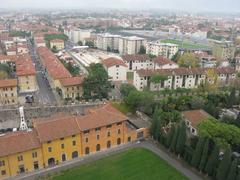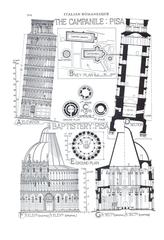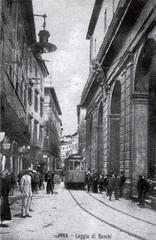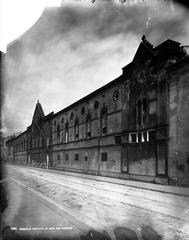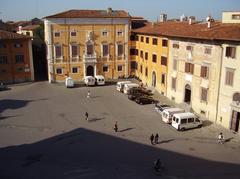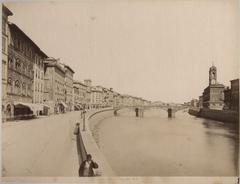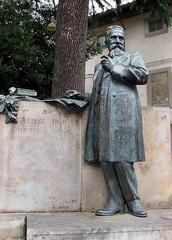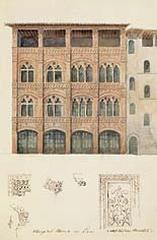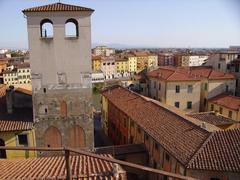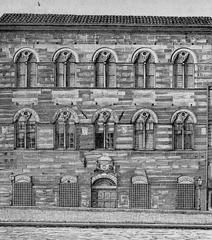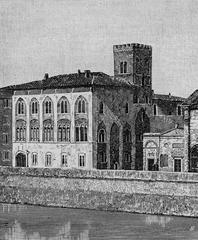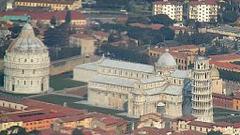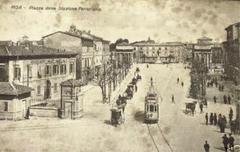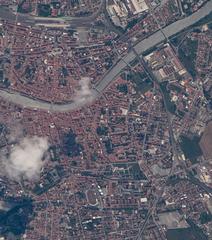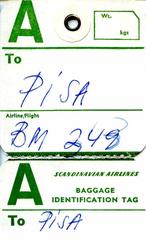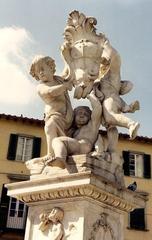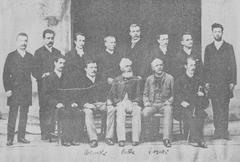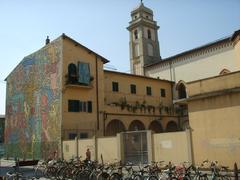Visiting the Arsenali Medicei: Hours, Tickets, and History
Date: 19/07/2024
Introduction
The Arsenali Medicei in Pisa, Italy, stands as a monumental testament to the city’s rich maritime history and the influential Medici family. Known in English as the Medici Arsenals, these shipyards were more than just simple docks; they were the beating heart of Pisa’s naval power and economic prosperity from the 12th century onward. The Arsenali Medicei offers visitors a captivating journey through centuries of naval innovation, economic development, and architectural splendor (Audiala).
Strategically located on the Arno River, the origins of the Arsenali Medicei can be traced back to the 12th century when Pisa was emerging as a formidable maritime republic. The shipyards, initially known as the “Arsenali della Repubblica,” played a pivotal role in maintaining Pisa’s powerful fleet, projecting the city’s influence far and wide (Audiala).
The arrival of the Medici family in the 15th century marked a golden era for the Arsenali. Recognizing the strategic importance of Pisa’s maritime capabilities, the Medici invested heavily in expanding and modernizing the shipyards. This period saw the construction of large shipbuilding hangars, workshops for skilled artisans, and fortified warehouses, transforming the Arsenali Medicei into a hub of innovation and naval supremacy (Audiala).
Today, the Arsenali Medicei stands as a blend of history and modernity. Preservation efforts are underway to restore and protect these historic structures, ensuring that future generations can appreciate their architectural and historical significance. The site has been repurposed as a cultural and civic center, hosting museums, art galleries, workshops, and events that celebrate Pisa’s rich maritime legacy (Audiala).
Table of Contents
- Introduction
- Birth of a Naval Powerhouse - Origins and Early Development
- The Medici Era - A Golden Age for the Arsenali
- Innovation and Engineering - The Arsenali as a Hub of Progress
- Economic Engine - Fueling Prosperity and Trade
- Decline and Transformation - From Shipyards to Urban Spaces
- The Arsenali Today - Preserving the Past, Embracing the Future
- Visitor Information
- Nearby Attractions
- Special Events and Guided Tours
- FAQ
- Conclusion
Birth of a Naval Powerhouse - Origins and Early Development
The story of the Arsenali Medicei begins in the 12th century, a time when Pisa, a burgeoning maritime republic, was establishing its dominance in the Mediterranean. The city’s strategic location on the Arno River, providing access to the sea, naturally lent itself to shipbuilding and naval pursuits.
The early arsenals, known as “Arsenali della Repubblica,” were likely modest affairs compared to their later grandeur. However, they served a crucial role in maintaining Pisa’s powerful fleet, which projected the city’s influence across the Mediterranean, engaging in trade, warfare, and exploration (Audiala).
The Medici Era - A Golden Age for the Arsenali
The arrival of the Medici family in the 15th century marked a turning point for Pisa and its arsenals. Recognizing the strategic importance of the city and its maritime capabilities, the Medici, particularly Lorenzo the Magnificent, invested heavily in expanding and modernizing the shipyards.
Under Medici patronage, the Arsenali Medicei were formally established, undergoing a period of significant expansion and development. New buildings were constructed, including large shipbuilding hangars, workshops for skilled artisans, and warehouses to store materials and supplies. The entire complex was fortified, reflecting its strategic importance and the need for protection from rival powers (Audiala).
Innovation and Engineering - The Arsenali as a Hub of Progress
The Medici’s ambition extended beyond merely increasing the size of the Pisan fleet. They sought to make the Arsenali Medicei a center of maritime innovation, attracting skilled shipwrights, engineers, and artisans from across Italy and beyond.
This focus on innovation led to the development of new shipbuilding techniques and the construction of larger, more powerful galleys. The Pisan galleys, built at the Arsenali, were renowned for their speed, maneuverability, and firepower, making them formidable warships and symbols of Pisa’s naval might (Audiala).
Economic Engine - Fueling Prosperity and Trade
The Arsenali Medicei were not just military installations; they were also economic powerhouses, driving Pisa’s prosperity during the Renaissance. The shipbuilding industry, fueled by Medici investment, created thousands of jobs for the city’s inhabitants.
Beyond shipbuilding, the Arsenali fostered a thriving ecosystem of related industries. Timber merchants supplied the vast quantities of wood needed for construction, while metalworkers forged nails, anchors, and cannons. Rope makers, sailmakers, and countless other artisans contributed their skills, making the Arsenali a bustling hub of activity and a testament to the interconnected nature of Renaissance economies (Audiala).
Decline and Transformation - From Shipyards to Urban Spaces
The decline of Pisa’s political fortunes in the late 16th century, coupled with the shifting naval landscape that favored larger warships, led to a gradual decline in the importance of the Arsenali Medicei. Shipbuilding activities dwindled, and the once-bustling complex fell into disuse.
Over the centuries, the Arsenali underwent a transformation, adapting to the changing needs of the city. Some sections were repurposed for various uses, including storage facilities, workshops, and even residential spaces. The grand shipbuilding hangars, once echoing with the sounds of hammers and saws, found new life as public spaces, hosting markets, exhibitions, and cultural events (Audiala).
The Arsenali Today - Preserving the Past, Embracing the Future
Today, the Arsenali Medicei stand as a captivating blend of history and modernity. While they no longer produce warships, they remain a powerful symbol of Pisa’s maritime heritage, offering a glimpse into the city’s vibrant past.
Preservation efforts are underway to restore and protect the remaining structures, ensuring that future generations can appreciate the architectural and historical significance of the Arsenali. The complex is gradually being transformed into a vibrant cultural and civic center, hosting museums, art galleries, workshops, and events that celebrate Pisa’s rich maritime legacy and foster a connection with its past (Audiala).
Visitor Information
Planning a visit to the Arsenali Medicei? Here’s what you need to know:
Ticket Prices and Opening Hours
The Arsenali Medicei is open to visitors from Tuesday to Sunday, 10 AM to 6 PM. Tickets are priced at €10 for adults, €8 for seniors and students, and €5 for children under 12.
Accessibility
The site is wheelchair accessible, with ramps and elevators available to ensure all visitors can explore the rich history of the Arsenali Medicei.
Travel Tips
The Arsenali Medicei is located in the heart of Pisa, easily reachable by public transport. Consider taking a guided tour to fully appreciate the historical significance and hidden gems of the site.
Nearby Attractions
While visiting the Arsenali Medicei, be sure to explore other nearby historical sites:
Leaning Tower of Pisa
A short walk from the Arsenali Medicei, this iconic landmark needs no introduction.
Piazza dei Miracoli
Home to the Cathedral of Pisa, Baptistery, and Camposanto Monumentale, this UNESCO World Heritage site offers a stunning array of architectural marvels.
Pisa Maritime Museum
Located nearby, this museum offers additional insights into Pisa’s rich maritime history.
Special Events and Guided Tours
The Arsenali Medicei hosts various special events throughout the year, including historical reenactments, maritime festivals, and educational workshops. Guided tours are available, offering in-depth knowledge and unique perspectives on the site’s history.
FAQ
Q: What are the Arsenali Medicei visiting hours?
A: The Arsenali Medicei is open from Tuesday to Sunday, 10 AM to 6 PM.
Q: How much are the tickets to visit the Arsenali Medicei?
A: Tickets are €10 for adults, €8 for seniors and students, and €5 for children under 12.
Q: Is the Arsenali Medicei wheelchair accessible?
A: Yes, the site is fully accessible with ramps and elevators.
Q: Are there guided tours available?
A: Yes, guided tours are available and highly recommended to fully appreciate the site’s history.
Conclusion
The Arsenali Medicei in Pisa is not just a historical site; it is a living testament to the city’s enduring connection to the sea and its ability to adapt and evolve over time. From its origins in the 12th century as modest shipyards, through its transformation under the Medici into a powerhouse of naval innovation, to its current role as a vibrant cultural and civic center, the Arsenali Medicei encapsulates the rich maritime heritage of Pisa (Audiala).
Visitors to the Arsenali Medicei can explore a unique blend of history and modernity. The site offers a comprehensive look into Pisa’s naval prowess, economic prosperity, and architectural ingenuity. With ongoing preservation efforts, the Arsenali Medicei continues to be a dynamic space where history, culture, and community converge. Whether you’re a history enthusiast, a maritime aficionado, or simply a curious traveler, a visit to the Arsenali Medicei promises an enriching and unforgettable experience (Audiala).
For those planning to visit, the Arsenali Medicei is open from Tuesday to Sunday, with ticket prices varying for adults, seniors, students, and children. The site is wheelchair accessible, ensuring that all visitors can explore its rich history. Don’t forget to check out nearby attractions such as the Leaning Tower of Pisa, Piazza dei Miracoli, and the Pisa Maritime Museum to complete your historical journey through this iconic Tuscan city (Audiala).
Stay updated on the latest events and information by following the Arsenali Medicei on social media and downloading the Audiala mobile app. Experience the rich maritime history of Pisa at the Arsenali Medicei today (Audiala).
References
- Audiala. “Exploring the Arsenali Medicei - History, Visiting Hours, and Tickets.” Audiala, 2023. source
- Audiala. “Exploring the Arsenali Medicei - Pisa’s Maritime Museum - Hours, Tickets, and Key Attractions.” Audiala, 2023. source
- Audiala. “Visiting Arsenali Medicei in Pisa - Hours, Tickets, and Visitor Tips.” Audiala, 2023. source
